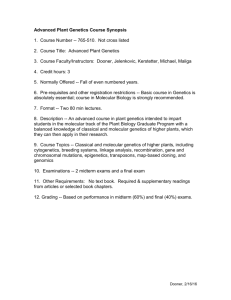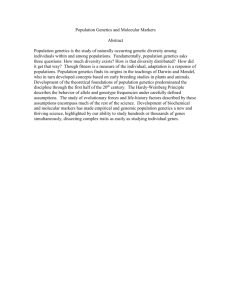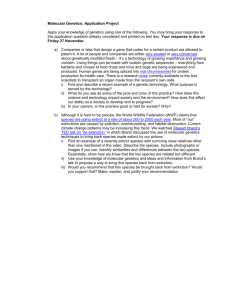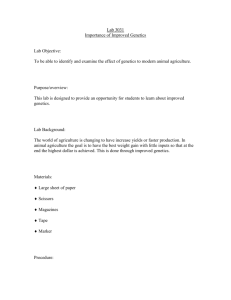2 Standard service - National Centre for Medical Genetics
advertisement
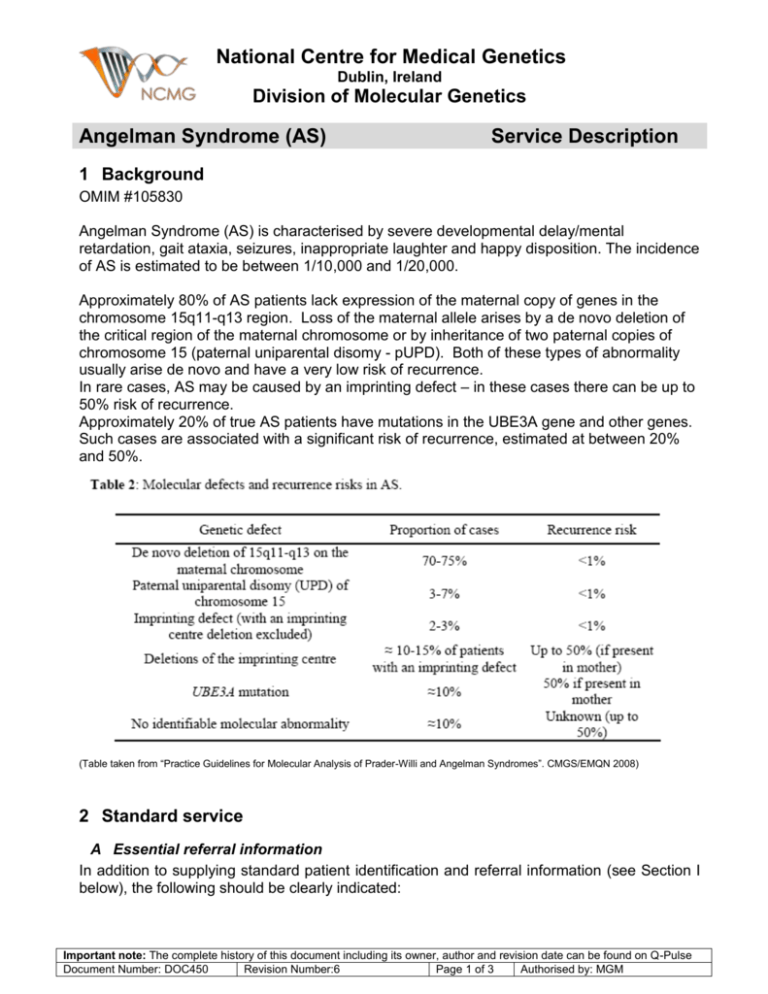
National Centre for Medical Genetics Dublin, Ireland Division of Molecular Genetics Angelman Syndrome (AS) Service Description 1 Background OMIM #105830 Angelman Syndrome (AS) is characterised by severe developmental delay/mental retardation, gait ataxia, seizures, inappropriate laughter and happy disposition. The incidence of AS is estimated to be between 1/10,000 and 1/20,000. Approximately 80% of AS patients lack expression of the maternal copy of genes in the chromosome 15q11-q13 region. Loss of the maternal allele arises by a de novo deletion of the critical region of the maternal chromosome or by inheritance of two paternal copies of chromosome 15 (paternal uniparental disomy - pUPD). Both of these types of abnormality usually arise de novo and have a very low risk of recurrence. In rare cases, AS may be caused by an imprinting defect – in these cases there can be up to 50% risk of recurrence. Approximately 20% of true AS patients have mutations in the UBE3A gene and other genes. Such cases are associated with a significant risk of recurrence, estimated at between 20% and 50%. (Table taken from “Practice Guidelines for Molecular Analysis of Prader-Willi and Angelman Syndromes”. CMGS/EMQN 2008) 2 Standard service A Essential referral information In addition to supplying standard patient identification and referral information (see Section I below), the following should be clearly indicated: Important note: The complete history of this document including its owner, author and revision date can be found on Q-Pulse Document Number: DOC450 Revision Number:6 Page 1 of 3 Authorised by: MGM National Centre for Medical Genetics Dublin, Ireland Division of Molecular Genetics 1. 2. Patient's symptoms. Any family history, including names, dates of birth, relationship and genetic test results if available. It is the responsibility of the referring clinician to ensure consent has been obtained for testing and storage. B Samples required: 3-5ml of blood in an EDTA tube. Sample identification policy is detailed at (see Section I below). Blood specimens must be appropriately packaged (see Section I), and preferably sent by courier to arrive as soon as possible. Do not freeze prior or during postage. Please note that extracted DNA is stored from patient’s samples at the National Centre for Medical Genetics, and kept indefinitely unless a written request for its disposal is received from the patient or their parent/guardian. C Restrictions on testing: There are no particular restrictions on testing. D Tests offered: 1. Diagnostic test – Methylation-specific multiplex ligation-dependent probe amplification (MS-MLPA) is used to detect copy number changes and analyse CpG island methylation patterns within the 15q11-q13 region (Prader-Willi/Angelman critical region). Absence of the maternal methylation pattern confirms a diagnosis of AS. 2. Mechanism of inheritance – when a diagnosis of AS is confirmed, the mechanism of inheritance (i.e. maternal deletion, pUPD or imprinting centre defect) is investigated in order to assess recurrence risks. MS-MLPA analysis can detect deletions of the 15q11-q13 critical region and can determine if the mechanism of inheritance is a maternal deletion. However if a deletion is not detected the mechanism could be either pUPD or an imprinting centre defect. MS-MLPA cannot distinguish between these. Further molecular analysis is necessary in order to investigate UPD. This requires parental samples in EDTA. 3. Where a diagnosis of AS is not excluded by the above test, the laboratory can arrange for detailed mutation screening to be undertaken elsewhere. E Diagnostic sensitivity of tests 4. Approximately 20% of true AS patients have mutations in UBE3A and other genes which will not be detected by this test. Therefore the diagnostic sensitivity of the genetic test is approximately 80%. F Interpretation: Results are given in the form of a written interpretative report to the referring clinician. Important note: The complete history of this document including its owner, author and revision date can be found on Q-Pulse Document Number: DOC450 Revision Number:6 Page 2 of 3 Authorised by: MGM National Centre for Medical Genetics Dublin, Ireland Division of Molecular Genetics G Target reporting times: As reporting times are constantly evolving, please refer to www.genetics.ie/molecular, or contact the molecular genetics laboratory, to receive up-to-date information on anticipated reporting times for your referral. The following are current target reporting times for each category of test offered (information correct as of 11/01/10): Urgent samples (newborns): 2 weeks Routine samples: 4-6 weeks UPD: 3 months Please contact the laboratory if you have not received a report within a week of your patient being due back in clinic. Please note it is our policy not to issue verbal results. Request for copies of reports on the day that your patient is in clinic cannot normally be accommodated. We usually require 24 hours notice in which to fax a copy of a report. H Further tests UBE3A: Bidirectional sequencing of exons 8-16 (functional coding sequence) is available via an external laboratory. TAT = 2 months, cost = £600 ? Imprinting centre (IC) defect: When a diagnosis of AS is confirmed using MSMLPA and both a deletion and UPD have been excluded as the mechanism of inheritance, further analysis can be performed in an external laboratory to confirm/exclude the presence of an IC deletion. Please contact us to make arrangements for such testing, if required. I Web Links to Related Documents Standard referral information/NCMG request form Sample/Patient identification policy Packaging of specimens for transport http://www.genetics.ie/pir/2006_NCMG_Referral_Form.pdf http://www.genetics.ie/pir/SampleIdentificationPolicyWeb.pdf http://www.genetics.ie/pir/sending_samples.pdf Please note that hard copies of the above documents may be requested from: Division of Molecular Genetics, National Centre for Medical Genetics, Our Lady’s Children’s Hospital, Crumlin, Dublin 12. Tel: 01 4096733; Fax: 01 4096971 The NCMG Molecular Genetics laboratory participates in external QA schemes run by the UK NEQAS for Molecular Genetics, the European Molecular Genetics Quality Network (EMQN), and the Cystic Fibrosis European Network. Results of assessments are available for inspection upon request. Important note: The complete history of this document including its owner, author and revision date can be found on Q-Pulse Document Number: DOC450 Revision Number:6 Page 3 of 3 Authorised by: MGM
